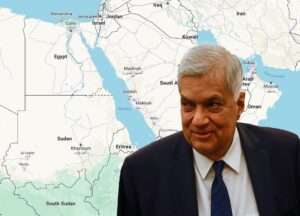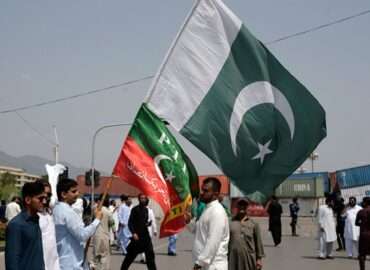Singapore and Sri Lanka are set to participate in the US-led Red Sea operation in response to attacks on cargo ships by Yemen’s Houthi group.
Navy Capt. Wickramasuriya informed NewsWire that the maritime force intends to deploy its ship “to safeguard international waters, encompassing the Red Sea, Arabian Sea, Gulf of Aden, and adjacent sea lanes frequented by merchant vessels.”
“The Sri Lanka Navy warship is being deployed as per the presidential order, but an exact date of deployment is yet to be confirmed,” he added.
However, the announcement sparked debate in the parliament, with the opposition questioning the benefits for Sri Lanka in engaging in operations against the Houthis.
Lawmaker Sajith Premadasa expressed concerns, stating that the deployment of a naval ship would cost SR 250 million ($775,270) for a debt-ridden nation.
What’s happening in the Red Sea?
Iranian-backed Houthi militants have intensified attacks on commercial vessels in the Red Sea, protesting Israel’s actions in Gaza. As a result, several shipping lines have halted operations, choosing longer routes around Africa.
U.S. Secretary of State Antony Blinken, during his Middle East tour, warned of “consequences” for the Houthis if ship assaults persist. The U.S. and its allies have consistently cautioned against such attacks since the group escalated activities in late 2023, linking their cessation to the conclusion of Israel’s conflict with Hamas in Gaza.
With a history of training and funding from Iran, the Houthis have targeted vessels in the Red Sea, ostensibly supporting Hamas against Israel, even when the targeted vessels have limited or no connections to Israel.
Major shipping companies have redirected vessels away from the Red Sea, impacting supply chains and increasing freight costs. This disruption may potentially affect the global economy, contributing to inflation.
The Houthis claim they target vessels associated with Israel in response to Israeli actions in Gaza and against Hamas, the militant group in control of the Palestinian enclave.
These Houthi strikes add to a series of disruptions showcasing the interconnected nature of shipping and its vital role in the global economy. Previous incidents include Iran’s 2019 attacks on oil tankers in the Strait of Hormuz, the 2021 Suez Canal blockage, and the current Panama Canal limitations due to drought.
As of early January 2024, these challenges have not substantially raised consumer prices, particularly in energy markets. The price of Brent crude, a U.S. benchmark, remains below the October average, although it fluctuates after major strikes. Europe may experience economic stress sooner than the United States due to the Red Sea being the sole route to the Suez Canal, linking major European consumers to their Asian suppliers.
How and why did Sri Lanka get involved?
President Ranil Wickremesinghe announced the deployment of a Sri Lanka Navy vessel to the Red Sea region, emphasizing its role in enhancing regional security against Houthi activities.
The involvement is a clear sign that Sri Lanka stands with the United States in its position on the Israel-Palestine conflict. State Minister of Defence Pramitha Bandara Tennakoon recently conveyed that the Government is committed to fulfilling its global responsibilities, underscoring Sri Lanka’s unwavering stance against terrorism. Tennakoon also emphasized that participating in the operations incurs no additional costs, as Sri Lanka’s ships are already actively patrolling an extensive maritime area in the Indian Ocean.
Despite the government’s assertion of commitment to a “two-state solution” between Israel and Palestine, Colombo’s recent actions contradict this stance. Merely days after Sri Lanka’s foreign affairs ministry called for a ceasefire amid escalating violence in Israel and Palestine in October, Prime Minister Wickremesinghe publicly denounced the Hamas assault.
What are the repercussions?
Siding with Israel, although not exclusively, will strain diplomatic relations with Arab and Muslim-majority nations, many of which traditionally support the Palestinian cause. Sri Lanka’s standing in regional and international organizations, particularly those with a focus on Middle Eastern affairs, could be affected. This is particularly important as Sri Lanka has had historic ties with Iran, and this move would most certainly shift that position.
Taking a pro-Israel stance may lead to security concerns, including potential threats from extremist groups sympathetic to the Palestinian cause. Sri Lanka may need to enhance security measures to mitigate any risks.
South Africa has formally presented a case at the International Criminal Court in The Hague, accusing Israel of engaging in genocidal acts during the ongoing conflict. The meticulous examination of the submission has affirmed its technical soundness. Academic and senior political analyst Marwan Bishara, speaking on Al Jazeera, attested to scrutinizing every detail of the submission and highlighted that each allegation is substantiated with provided evidence.
Navi Pillai, a South African and Chairperson of the United Nations Commission of Inquiry on the Occupied Palestinian Territory, was queried by Al Jazeera about Israel’s actions in Gaza strip. In response, she rejected the notion of it being an act of self-defense, characterizing it instead as “collective punishment.”
In a divergent scenario, questions arise concerning the involvement of a Sri Lankan Navy ship in the Red Sea. Coming from an economically challenged nation grappling with debt, heavily reliant on the IMF, and facing an impending economic crisis, the Sri Lankan Navy’s engagement in a conflict with the Houthis prompts scrutiny. This occurs against a backdrop of accusations of genocide and collective punishment, classified as war crimes.
Is Sri Lanka potentially acting as mercenaries to offset financial obligations, and if so, is this decision well-informed? The absence of clear information raises concerns that such a military deployment could be a unilateral geopolitical move by the President. Shouldn’t critical decisions of this nature involve careful deliberation and consultation, including engagement with Opposition parties?






